- Home
- Jeanne Kalogridis
The Borgia Bride
The Borgia Bride Read online
FOR JANE JOHNSON
FOR THE CHANCE
Contents
Prologue
Autumn 1488
Chapter I
Late Spring 1492
Chapter II
Late Summer 1492–Winter 1494
Chapter III
Winter–Spring 1494
Chapter IV
Summer 1494–Winter 1495
Chapter V
Winter 1495
Chapter VI
Chapter VII
Spring–Summer 1495
Chapter VIII
Summer 1495–Late Spring 1496
Chapter IX
Late Spring 1496
Chapter X
Chapter XI
Chapter XII
Chapter XIII
Chapter XIV
Summer 1496
Chapter XV
Chapter XVI
Autumn 1496–Early Spring 1497
Chapter XVII
Spring–Summer 1497
Chapter XVIII
Chapter XIX
Chapter XX
Chapter XXI
Autumn 1497
Chapter XXII
Early Spring 1498
Chapter XXIII
Summer 1498
Chapter XXIV
Autumn–Winter 1498
Chapter XXV
Spring 1499–Winter 1499
Chapter XXVI
Spring–Summer 1499
Chapter XXVII
Late Summer 1499
Chapter XXVIII
Autumn–Winter 1499
Chapter XXIX
Late Winter 1499
Chapter XXX
Winter–Early Summer 1500
Chapter XXXI
Summer 1500
Chapter XXXII
Chapter XXXIII
Chapter XXXIV
Late Summer 1500–Spring 1501
Chapter XXXV
Summer 1501–Early Winter 1503
Chapter XXXVI
Summer 1503
Chapter XXXVII
Chapter XXXVIII
Afterword
Acknowledgements
Prologue
The canterella, it is called: a poison powder so deadly a mere sprinkling of it can kill a man, strike him down in a matter of days. The effects are ghastly. One’s head aches as if in a vice; the vision blurs; the body quakes with fever. The bowels release a bloody flux, and the gut clamps tight in an agony that makes the victim howl.
Rumour says only the Borgias know its secret: how to compound it, store it, administer it so as to hide the taste. Rodrigo Borgia—or shall I say, His Holiness Alexander VI—learned the secret from his favourite mistress, the fiery-haired Vannozza Cattanei, when he was still a cardinal. Rodrigo’s elder brother, Pedro Luis, would undoubtedly have been elected pope…were it not for subtle and well-timed administration of the canterella.
Being generous parents, Rodrigo and Vannozza shared the recipe with their offspring—at the very least with their sweet-faced daughter, Lucrezia. Who better to lull the wary into carelessness than she with the demure smile and the soft voice? Who better to murder and betray than she who is hailed as Rome’s greatest innocent?
The ‘Borgia fever’ has decimated Rome like the plague, thinning the ranks of prelates until every cardinal with land and a bit of wealth lives in terror. After all, when a cardinal dies, his riches go at once to the Church.
And it takes a great deal of wealth to fund a war. A great deal of wealth to amass an army large enough to capture every city-state in all of Italy, and declare oneself leader not only of things spiritual, but of things secular. This pope and his bastard son, Cesare, want more than Heaven; they will have Earth, as well.
In the meantime, I sit in the Castel Sant’Angelo with the other women. From my chamber window, I can see the Vatican nearby, the papal apartments, and the Palazzo Santa Maria where I once lived with my husband. I am allowed to roam the grounds and am accorded courtesy, but there is no more status, and I am under guard, a prisoner. I curse the day I first heard the name Borgia; I pray for the day when I hear the bells toll for the old man’s death.
But there is freedom to be had. At this very moment, I hold the vial up to the bright Roman sun that streams into my generously-appointed apartment. The container is Venetian glass, emerald-coloured, shining like a gem: the powder inside is drab bluish-grey, opaque.
Canterella, I whisper. Beautiful, beautiful canterella, rescue me…
Autumn 1488
I
I am Sancha of Aragon, natural daughter of the man who became Alfonso II, King of Naples, for a year and a day. Like the Borgias, my people came to the Italian peninsula by way of Spain, and like them, I spoke Spanish at home and Italian in public.
My most vivid childhood memory was formed at the end of my eleventh summer, on the nineteenth of September, the year of our Lord 1488. It was the Feast Day of San Gennaro, patron saint of Naples. My grandfather, King Ferrante, had chosen that particular date to celebrate the thirtieth anniversary of his ascension to the Neapolitan throne.
Normally, we royals did not attend the event held in Gennaro’s grand Duomo, the cathedral built in his honour. We preferred to celebrate in the comfort of the Chiesa Santa Barbara, the church enclosed within the magnificent walled grounds of the royal palace, the Castel Nuovo. But that year, my grandfather deemed it politic to attend the public ceremony, given the anniversary. Thus, our large entourage processed into the Duomo, watched at some distance by the zie, the aunts, di San Gennaro, the wailing, black-clad women who pleaded with the Saint to protect and bless Naples.
Naples needed blessing. It had been the site of many wars; my family of Aragonese royalty had won the city through bloody battle only forty-six years prior. Although my grandfather was peacefully handed his throne by his father, the revered Alfonso the Magnanimous, Alfonso had violently wrested Naples from the Angevins, supporters of the Frenchman Charles of Anjou. King Alfonso was beloved for rebuilding the city, for constructing grand palaces and piazzas, strengthening the walls, restocking the royal library. My grandfather was less loved. He was more interested in maintaining a strong hold on the local nobles whose veins held Angevin blood. He spent years in petty wars against different barons, and never came to trust his own people. In turn, they never came to trust him.
Naples had also been the site of earthquakes, including one witnessed in 1343 by the poet Petrarch, which razed half the city and sank every ship in the normally placid harbour. There was also Monte Vesuvio, which was still prone to eruptions.
For these reasons, we had come to beseech San Gennaro that day, and, with luck, to witness a miracle.
The procession into the Duomo was no less than grand. We royal women and children entered first, escorted by blue-and-gold clad guards to the front of the sanctuary, past the black-clad commoners who bowed before us like wheat beneath the wind. Ferrante’s Queen, the nubile Juana of Aragon, led us, followed by my aunts Beatriz and Leonora. They were followed by my then-unmarried half-sister Isabella, who had been assigned the care of myself and my eight-year-old brother, Alfonso, as well as Ferrante’s youngest daughter, my aunt Giovanna, born the same year as I.
The older females were dressed in the traditional garb of the Neapolitan noblewoman: black gowns with full skirts, tightly-laced bodices, and sleeves narrow at the shoulders then blossoming to the width of church bells at the wrist, so that they draped downward well past the hip. We children were allowed colour: I wore a gown of bright green silk with a brocade bodice laced tightly against absent breasts. Around my neck hung pearls from the sea, and a small gold cross; on my head was a veil of black gossamer. Alfonso wore a pale blue velvet tunic and breeches.
My brother
and I walked hand-in-hand just behind my half-sister, careful not to trip on her voluminous skirts. I did my best to look proud and self-assured, my gaze restricted to the back of Isabella’s gown, while my brother stared freely out at the assembly. I allowed myself one sidewise glance, at the great cracks in an archway between two large marble columns; above it, a round portrait of Saint Dominic had split in two. A scaffolding stood just beneath it, marking the last of the repairs from an earthquake that had ravaged the Duomo two years before Ferrante came to power.
I was disappointed to have been left in Isabella’s care, and not my mother’s. My father usually invited my mother, Madonna Trusia Gazullo, a ravishing golden-haired noblewoman, to all functions. He particularly delighted in her company. I believe my father was incapable of love, but certainly he must have come close to it in my gentle mother’s arms.
King Ferrante, however, declared it unseemly to bring my father’s mistress as part of the royal entourage inside a church. Just as strongly, my grandfather insisted that my brother Alfonso and I come. We were children, not to be blamed for the accident of our parentage. After all, Ferrante himself was of illegitimate birth.
For that reason, my brother and I had been raised as royal children, with all rights and privileges, in the Castel Nuovo, the king’s palace. My mother was free to come and go as my father wished, and often stayed at the palace with him. Only subtle reminders from our half-siblings and more pointed ones from our father reminded us that we were lesser creations. I did not play with my father’s legitimate children, as they were several years older, or with my Aunt Giovanna or Uncle Carlo, both close to my own age. Instead, my little brother Alfonso and I were inseparable companions. Though my father’s namesake, he was the opposite: golden-curled, sweet-faced, good-natured, his sharp intelligence remarkably free of guile. He had Madonna Trusia’s pale blue eyes, while I resembled our father to such a striking degree that, had I been a son, we would have been twins separated by a generation.
Isabella led us to an aisle at the front of the sanctuary which had been roped off; even after we had settled into our place in the Duomo, my brother and I continued to clasp hands. The great cathedral dwarfed us. High overhead, the distance of several Heavens, was the massive, gilded cupola, rendered dazzling by the sunlight that streamed in through its arching windows.
The royal men came next. My father—Alfonso, Duke of Calabria, that sprawling, rustic region far to the south, on the eastern coast—led the way. Heir to the throne, he was renowned for his ferocity in battle; in his youth, he had wrested the Strait of Otranto from the Turks in a victory that brought him glory, if not the people’s love. His every move, every glance and gesture, was imperious and forbidding, an effect accentuated by his severe costume of crimson and black. He was more beautiful than any woman present, with a perfect straight, thin nose and high, upward-slanting cheekbones. His lips were red, full, sensuous beneath his thin moustache, his dark blue eyes large and arresting beneath a crown of shining jet hair.
Only one thing marred his handsomeness: the coldness in his expression and eyes. His wife, Hippolyta Sforza, had died four years before; the servants and our female relatives whispered she had given up in order to escape her husband’s cruelty. I remembered her vaguely as frail with bulging eyes, an unhappy woman; my father never failed to remind her of her failings, or the fact that theirs was a marriage of convenience because she came from one of Italy’s most ancient and powerful families. He also assured poor Hippolyta that he took far greater pleasure in my mother’s embrace than in hers.
I watched as he moved in front of us women and children, forming a row directly in front of the altar, to one side of the empty throne that awaited the arrival of his father, the King.
Behind him came my uncles: Federico and Francesco. Then came my father’s eldest son, named for his grandfather, but affectionately called Ferrandino, ‘little Ferrante’. He was nineteen then, second in line to the throne, the second most handsome man in Naples but the most attractive, for he possessed a warm, outgoing nature. As he passed the worshipers, feminine sighs echoed in his wake. He was followed by his younger brother Piero, who had the misfortune to resemble his mother.
King Ferrante entered last, in breeches and a cape of black velvet, and a tunic of silver brocade embroidered with fine gold thread. At his hip was the sheathed, jewelled sword given him upon his coronation. Though I knew him as an old man with a limp exacerbated by gout, on this day he moved gracefully, without any hesitation in his gait. His good looks had been eroded by age and indulgence. His hair was white, thinning, revealing a scalp burned pink by the sun; he had a ponderous double chin beneath his trimmed beard. His eyebrows were dark and startling, especially in profile, due to each thick hair’s attempt to launch itself in a different direction. These stood above eyes strikingly like mine and my father’s—an intense blue with hints of green, capable of changing colour depending on the light and hues surrounding him. His nose was red, pock-marked, his cheeks covered with broken veins. But his bearing was straight, and he was still capable of silencing a crowd simply by walking into a room.
His solemn expression, upon entering the Duomo San Gennaro, generated pure ferocity. The crowd knelt even lower, and waited for the King to settle himself upon a throne near the altar.
Only then did they dare rise; only then did the choir begin to sing.
I craned my neck and caught a glimpse of the altar, where a silver bust of San Gennaro wearing his bishop’s mitre had been placed in front of burning tapers. Nearby stood a marble statue, slightly larger than life, of Gennaro in full regalia, two fingers of one hand lifted in blessing, a crosier resting in the crook of his arm.
Once the King was situated and the choir had fallen silent, the Bishop of Naples emerged and gave the invocation; his assistant then appeared, bearing a silver reliquary in the shape of a lantern. Behind the glass was something small and dark: I could not see clearly from my position, being too short—my view was blocked by the backs of my black silk-clad aunts and the men’s velvet capes, but I peeped in between. I knew it was a vial containing the dried blood of the martyred San Gennaro, tortured, then brutally beheaded on the orders of the Emperor Diocletian over a thousand years before.
Our bishop and the priest prayed. The zie di San Gennaro let out sonorous wails, beseeching the saint. Carefully, the priest, without touching the glass, turned the reliquary end-over-end, one time, then two.
An eternity seemed to pass. Beside me, Isabella had lowered her head and shut her eyes, her lips moving in a silent prayer. On my other flank, little Alfonso had lowered his head solemnly, but was peering out from beneath his curls in fascination at the priest.
I believed fervently in the power of God and the saints to intervene in the affairs of men. Deeming it safest to follow Isabella’s example, I bowed my head, squeezed my eyes closed, and whispered a prayer to Naples’ patron saint: Bless our beloved city, and keep it safe. Protect the King and my father and mother and Alfonso. Amen.
A murmur of awe passed through the crowd. I caught a glimpse of the altar, of the priest proudly displaying the silver reliquary, holding it up for the crowd’s scrutiny. ‘II miracolo e fatto,’ he proclaimed.
The miracle is accomplished.
The choir led the congregation in singing the Te Deum, praising God for bestowing this blessing.
From my vantage point I could not see what had occurred, but Isabella whispered in my ear: the dark, dried substance in the vial had begun to melt, then bubble, as the ancient blood once again became liquid. San Gennaro signified that he had heard our prayers, and was pleased; he would protect the city which he had served as bishop during his mortal years.
It was a good omen, she murmured, especially for the King on his anniversary. San Gennaro would protect him from all enemies.
The current Bishop of Naples took the reliquary from the priest and stepped down from the altar to the throne. He held the square, silver-and-glass box before King Ferrante and waited fo
r the monarch to unseat himself and approach.
My grandfather neither rose nor knelt in the presence of such a marvel. He remained settled on his throne, forcing the bishop to bring the reliquary to him. Only then did Ferrante yield to ancient custom and press his lips to the glass, beneath which lay the sacred blood.
The bishop retreated to the altar. The royal males of Aragon then approached one by one, my father first, and kissed the holy relic in turn. We women and children followed—I and my brother still firmly clinging to each other. I pursed my mouth against the glass, warmed by the breath of my relatives, and stared at the dark liquid housed inside. I had heard of miracles, but never before seen one; I was amazed.
I stood beside Alfonso as he took his turn; afterwards, we processed back to our assigned places.
The bishop handed the reliquary back to the priest and made the sign of blessing, two fingers of his right hand slicing a cross through the air, first over my grandfather, then over the assembled royal family.
The choir broke into song. The old King rose, a bit stiffly. The guards left their positions about the throne and preceded him outside the church, where carriages waited. As always, we followed.

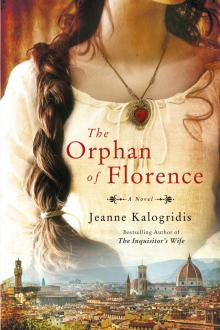 The Orphan of Florence
The Orphan of Florence Lord of the Vampires
Lord of the Vampires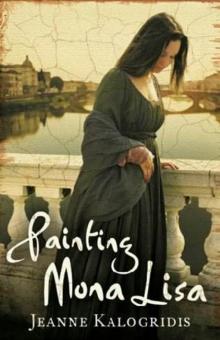 Painting Mona Lisa aka I, Mona Lisa
Painting Mona Lisa aka I, Mona Lisa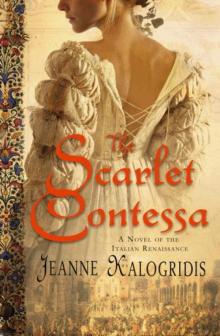 The Scarlet Contessa
The Scarlet Contessa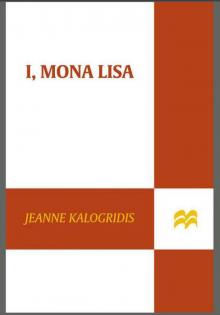 I, Mona Lisa
I, Mona Lisa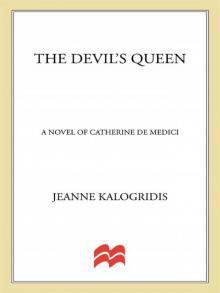 The Devil's Queen: A Novel of Catherine de Medici
The Devil's Queen: A Novel of Catherine de Medici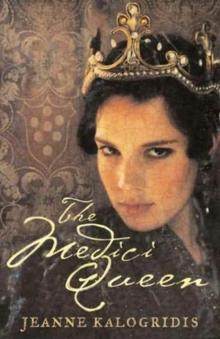 The Medici Queen aka The Devil’s Queen
The Medici Queen aka The Devil’s Queen The Inquisitor's Wife
The Inquisitor's Wife The Borgia Bride
The Borgia Bride